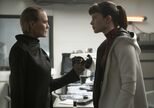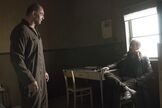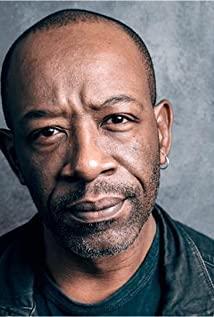K lived a life like a Puritan, was scorned by his colleagues as "fake", doing dirty work that mankind was unwilling to do, but regarded mankind as God. He has never doubted the identity of his N9 clone "angel". He has strong physical and intellectual power to perform high-intensity tasks, and he can kill himself immediately after receiving instructions. He has examined and understood himself, and he admitted that he has no memory, no dream, and he cannot become a man or a god.
By accidentally investigating the Son of Miracle, he found step by step that he could approach mankind with the bond of fertility. After suspicion and collapse, he accepted the identity of what he thought was the son of heaven. That he could be less discriminated against but was "warned" not to be approached. The identity of the demihuman. But Fate made a joke with him, he is not a "prince", but a "civet cat". It's a bit like the fallen seven angels in Paradise Lost. They were ordered by God to guard mankind, but they began to wonder "Why should I guard mankind", and later fell to hell by fornicating with mankind and imparting knowledge of mankind. K also doubted himself, and faintly came up with the answer "So I can approach humans". But the difference is that K finally did not achieve equality with human beings in a way that was awake. His approach to humans is to use his physical identity to become a legal person with partial human characteristics. The "legitimacy" of this fertility bond is still the moral ethics of human society. It can be said that he has not psychologically recognized the idea that copying humans can be equal to humans. This is completely different from the self-recognition of the seven angels.
K felt infinitely vain, he was still the most obedient N9 "angel" that was denied, not an "angel Satan" who recognized himself. He wanted to rely on the existence of others, and finally had to accept the ridicule of the rebel leader Teresa that "everyone felt that he should be the son of a miracle", accepted the identity of the N9 clone, and would never be the child of the N7 miracle.
"2049" is like the gentle absurdity in Camus' words. In "The Myth of Sisyphus", Camus used the absurd hero Sisyphus who was punished by God and had to push down rocks from the top of the mountain forever to prove his absurd philosophy. But for ordinary people, Camus does not describe it as an alienated beetle like Kafka, but uses gentle and introspective brushstrokes to describe the ordinary life of ordinary people, pointing directly to the belonging, loneliness, and absurdity of people. For example, the "I" in "The Outsider" was convicted in court for not crying at his mother's funeral. "2049" is a calm and restrained narrative of K, the perfect outsider, like Camus. From stunned when he saw Rachel’s serial number, to smashing the door after the memory was proved to be true, to lying on the stone steps and watching the floating snow, with the changes and collapses of his self-identity, he went from being a perfect one. The executor "angel" began to ask questions to himself, but the final answer was not what he wanted in his heart.
"2049" is not as strong as the question in 82 years. I remember that in 2019, the N6 Roy could not escape the life span of 4 years after his awakening. Before his death, he faced the N7 Blade Runner Dyke and said that the most classic and most shocking Lines. "The things I have seen, you humans are absolutely unbelievable. I witnessed the battleship catching fire on the edge of the Orion constellation, and I watched the C-ray shining in the darkness near the gate of Don Wise. All these moments will eventually be lost in time. It’s like tears disappearing in the rain. The time for death has arrived.” In 2049, K’s end has no doubts or resistance, no blood and tears mixed in the rain, and no thought-provoking lines. He just lay there, on the falling snow steps, silently guarding the N7-2, the human dream maker, the son of miracle, and the daughter of a father who had the legal status he had longed for. He is just K and lost Joi's K. He didn't torture anyone, he just watched the snowflakes fall blankly, the voice was very soft, but very moving.
What puzzles me is, why should K be implanted with the memory of the Chosen Son, and K is precisely the police officer investigating the Chosen Son? Is this just a coincidence? Is it in a very small probability that the most obedient "angel" of the N9 type K has awakened because of existential bewilderment? Or was K originally chosen by the rebels as the scapegoat for the Son of Miracle? In other words, if the memory is implanted in the heads of other clones, K will investigate all the way to kill or become an enemy of the Chosen Son. Because, the children of the Chosen were born in the old N7 after the clone rebellion in 2019, and they had some consciousness at that time. The K is an Angel N9 produced by Teri, which is very reliable and can kill itself without resisting any instructions.
Make the worst guesses and not logically discuss the feasibility of whether K is a scapegoat. Then the most terrible thing is that both awakening and love are designed. Dyke's fall in love with Rachel was designed by program instructions, not by copying spontaneous love between people, as Wallace mentioned. The awakening of K's self-consciousness was born of misleading K by the bureau designed by the copyist. So the most frightening thing is that when you fall in love with someone, you find that your love is a designed program. When you torture yourself, you find that your torture is induced by others. When cognition is based on illusion, reality has never existed, and the fate of the duplicator is so absurd that it almost swallows the watching me. But at an unknown moment, after knowing his life experience, K became calm. He desperately strangled Luv, a female clone who was also an N9, intercepted Dyke, who he almost recognized as his father, and sent him to the white building where he was deceived and cried bitterly. Dyke will recognize his daughter, and he, he just lay there, ignoring his entanglements with clones and humans. Compared with the N6 model, which is desperately trying to break the boundary between humans and clones, K's "acceptance" and "face" is not a kind of awakening, a kind of rebellion.
Camus believes that "absurdity refers to the conflict between irrationality and the desire that must be clear, and it is the confirmation of its limitations by sober reason." If absurdity is already a reality, then it is ought to recognize absurdity, fight against absurdity, and pursue individual happiness. K's destiny in "2049" is like being punished Sisyphus, pushing the boulder up the mountain endlessly and repeatedly. For K, memory is not enough to prove existence, memory is just a piece of code that makes oneself more like a human, and memory can even be used to deceive oneself. But absurdity exists, absurdity is destiny and self. Passing away with the identity of the chosen son, K admits his absurdity and dominates this absurdity. Then I think that when K helped Dyke recognize his daughter in the end, he was in pain, but by no means unhappy.
View more about Blade Runner 2049 reviews









